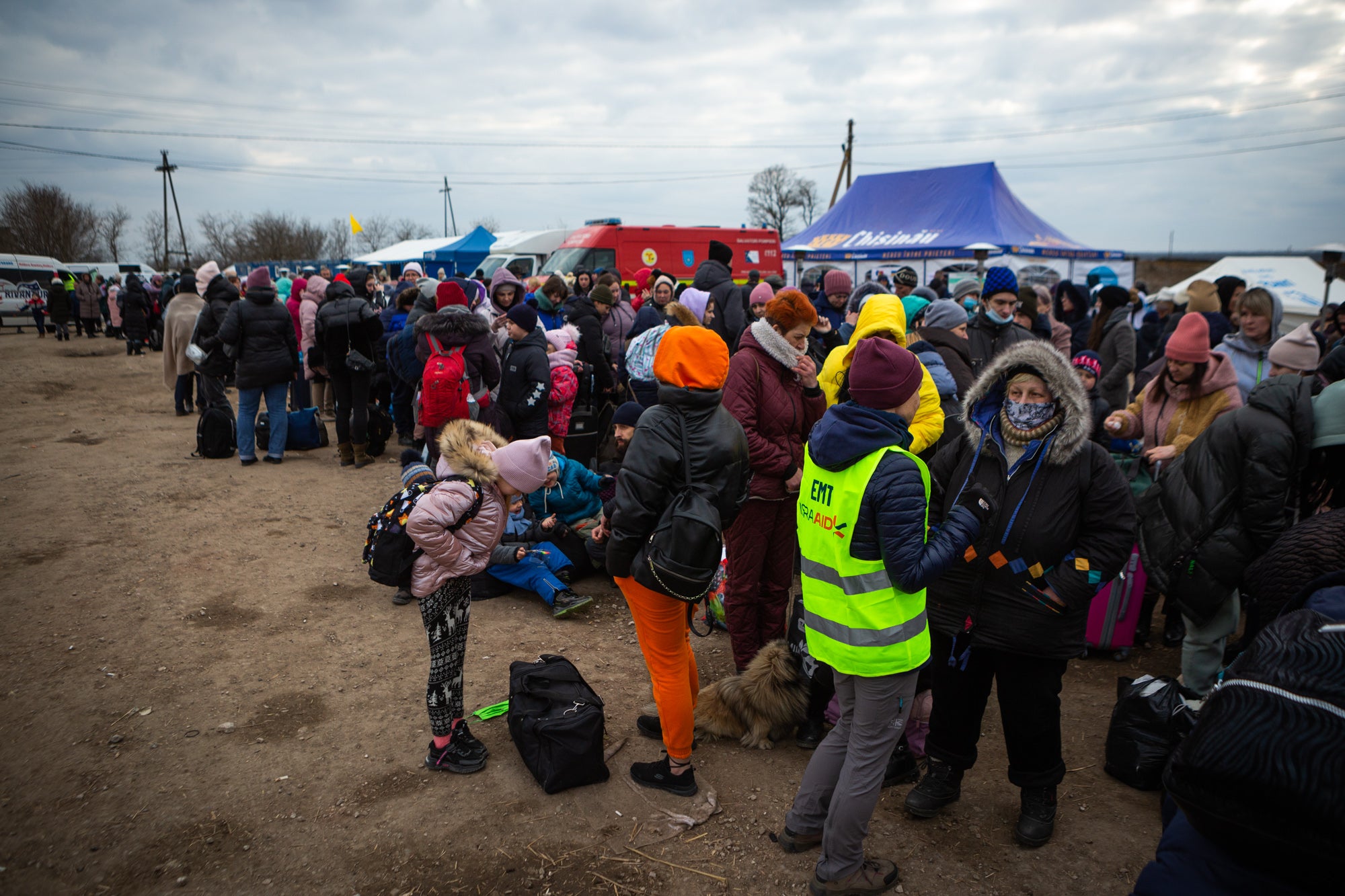What I learned helping refugees at the Moldova-Ukraine border
What has been done by Vladimir Putin in recent days and weeks will take months or years to overcome


On the drive down from Chisinau, the sun was shining. I turned to one of my colleagues and pointed it out. In more than a week in Moldova, it was only the second time I’d seen sunshine.
When we got out of the car at Palanca the sky had turned grey; soft flakes of snow began to fall. The cold seeped through every layer, burrowing deep into my bones.
Palanca is a flashpoint in the fastest-growing humanitarian crisis Europe has seen in decades. It’s also a grey, almost liminal, space. Deep in the Moldovan hinterland, yet only 30-odd miles from Odessa, brown mud and jagged, bare trees abound. Small communities try everything they can to help their neighbours, attempting to bring some measure of solace and support to a world suddenly ruptured.
We walked over to the big white and blue tent with the beer company logos. When we asked to set something up for mothers and babies, this was all they had. We had kitted it out well: heaters, chairs, a changing table, a raised platform with plastic grass for children to sit and play.
Still, it’s not enough. Not enough space, not enough chairs, not enough warmth, not enough light.
Every day, thousands of people cross the border here. The tents were at the crossing itself, down a small road, one lane each way. Quickly, this small cluster grew – more tents, more cars, more people coming, day and night.
This inevitably became a bottleneck, with government officials, local volunteers, relief workers, and journalists jostling for space with cars, vans, and buses. People were everywhere. There were no signs, no announcements. Families would wait in the tent for hours, unsure where to go, what to do, who to speak to, and who even knew they were waiting.
About three or four days after we first made it to the border, the president visited Palanca and instructed the local authorities to move everything – the tents, the food, the buses, the cars – to a field about three kilometres in. So, the next day, everything moved.
Our new teammates didn’t believe me when I said it looked a lot better now. The cars and buses had somewhere to park. There were people calling out destinations like “Chisinau” and “Bucharest” – and on good days the new arrivals only had to wait a few minutes, or maybe an hour or two, before they moved on.
But how do they decide where to go? For those who don’t have a clear destination in mind, there’s precious little information available about what options are open. In the chaos and the cold, decisions have to be taken quickly. It’s hard to guarantee the choices people make will keep them safe.
Some we met wanted to keep moving. Some just spoke about returning home. Others showed us videos of bombed-out buildings, their homes in ruin. Some wanted to help, offered to go around with us as we handed out blankets or information sheets with guidance on managing children’s stress in times of crisis.
Many waited anxiously for news of relatives, friends, or distant acquaintances, still in line on the other side. Many held their children – or their pets – under blankets, shivering, trying to get warm.
The village after Palanca is Tudora. Many Tudora residents have opened their doors to Ukrainian refugees. The local pastor organised volunteers to staff the mother and baby tent day and night. His church has become a warehouse, stuffed to the brim with diapers and blankets and other necessities. We worked together to make sure these local communities have the knowledge, skills, and resources they need to provide support for as long as they are needed. This will go on for a long time.
Even if the war ends tomorrow, Palanca will still be here. The thousands of Ukrainians who have already passed through will still be here or in shelters in Chisinau or with relatives in Athens, Oslo or Berlin. What has been done in recent days and weeks by Vladimir Putin will take months or years to overcome.
I got back into the car and tried to warm my hands. I had heating and snacks. I had a warm bed in a Chisinau hotel.
Our team will be here for at least a year, maybe three or four, but I’m able to go home.
In the fog driving to the airport, I could barely see what was coming down the road.
Ethan Schwartz works for IsraAID, the international humanitarian aid NGO. As part of the Emergency Team in Moldova, responding to the Ukrainian refugee crisis
The Independent has a proud history of campaigning for the rights of the most vulnerable, and we first ran our Refugees Welcome campaign during the war in Syria in 2015. Now, as we renew our campaign and launch this petition in the wake of the unfolding Ukrainian crisis, we are calling on the government to go further and faster to ensure help is delivered. To find out more about our Refugees Welcome campaign, click here. To sign the petition click here. If you would like to donate then please click here for our GoFundMe page.

Join our commenting forum
Join thought-provoking conversations, follow other Independent readers and see their replies